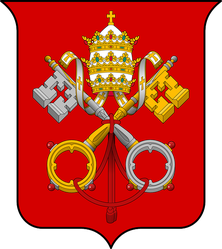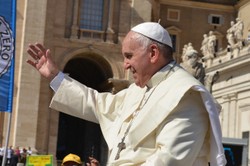According to Catholic Online it is the local bishop who is first approached. The person to be considered must have been virtuous, except for a martyr, and follow the orthodoxy of doctrine. The bishop may then send the cause on to a panel of theologians at the Vatican, if the bishop is inclined to do so. The person is first considered venerable. This normally has a waiting period of at least five years after the person being considered has died. This removed much f the emotional appeal and makes the decisions more objective.
The next step is proof of a miracle that occurred as the result of intersection by the candidate. To clarify things here, people pray in adoration only to God, but may offer prayers of petition through saints and those who are at least venerable in the hope that the petitioned intercedes with God on their behalf. Care must be taken here, for if a new medical technique is being tried, or if the petitioner also prays to God Himself or a canonized saint the miracle would not be ascribed to the candidate for sainthood. There must be no other possible explanation of the miracle, and no other petitioned for the miracle.
If the person who has been declared venerable can be shown responsible for successfully interceding with God for a miracle, except for martyrs, the person is considered to be beatified. The process continues requiring a second miracle, then the candidate is presented to the Pope, and only the Pope can canonize. Because the process carries infallibility the Pope can either accept or deny the candidate. The infallibility of the Pope only applies to when he speaks officially on matters of faith or morals, but canonization is considered one of those times.
Actually, only God can make a saint, the above process merely recognizes what God has done.








 The Linear Equation and Related Equations and Inequalitieson 08/15/2024
The Linear Equation and Related Equations and Inequalitieson 08/15/2024
 Understanding Calculus: A Simplified Approach to Derivativeson 08/05/2024
Understanding Calculus: A Simplified Approach to Derivativeson 08/05/2024
 Limits: Vital Building Blocks of Calculuson 08/01/2024
Limits: Vital Building Blocks of Calculuson 08/01/2024
 Mardi Gras Collectibleson 02/02/2023
Mardi Gras Collectibleson 02/02/2023



Comments
An ancient rule of the church is that you can only be made a saint by the church to which you belong, so imagine that after his death the church wanted to make Archbishop Desmond Tutu a saint, only the Anglican Church could make the decision. Other churches would then be entitled to accept or reject it, according to their own judgment.
I did hear that Lutherans considered adding Dietrich Bonhoffer, the anti-Hitler pastor, to the list of canonized saints, but nothing came from it.
Following up on the last sentence, the bishops who met in the Anglican Church to have Charles I added to the Anglican saints seem to not have had an established authority to add him, but he was for a time mentioned in the Common Book of Prayer of the Anglican Church, an official mention in some capacity. I am not so familiar with the Anglican Church formal rules, and it is vague in the reference I used.
I believe so as well. There are only so many canonized saints needed for patron saints for most occupations and countries. And it is such a strict process, an individual requesting a case to be opened would not be considered normal, that few are being added. We must remember that while many proclaimed saints in the early church did not become canonized, there were many worthy candidates who did, such as the eleven faithful Apostles and Saint Paul. So, once the rules were established quite a few canonizations followed over the years. I must hasten to point out that the process did take some time. There was no rush to canonize those who had been previously considered saints.
The advantage of canonization is the saint, or I believe as least venerable person, is allowed to be mentioned officially in church.
Very good. I believe that there are more uncanonised saints than canonised ones. Good people who quietly live out their lives in kindness. Unnoticed by many.
Thanks, Frank. Yes, and canonization required those proclaimed saints in the older method were not necessarily carried over. Only after it became the current process involving the Pope did it become what is considered a valid canonization.
An informative article. It is worth noting that the Catholic Church took charge of the process not to be bossy, but to prevent local abuses in which unsuitable characters were elevated to sainthood.